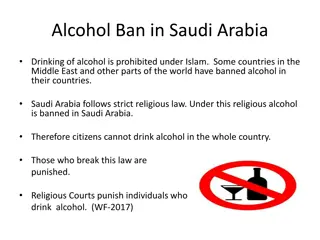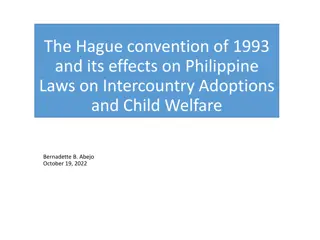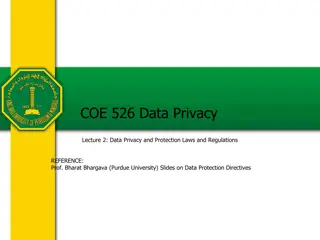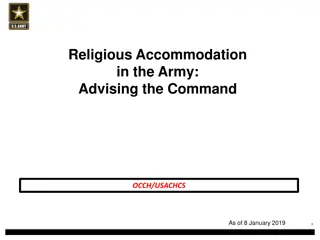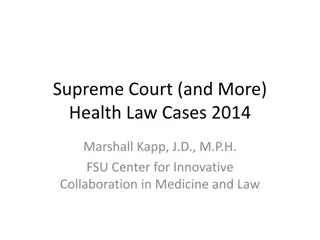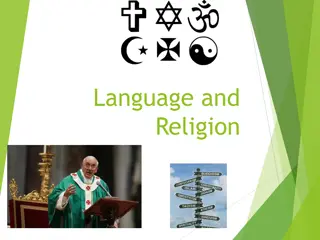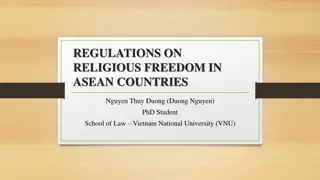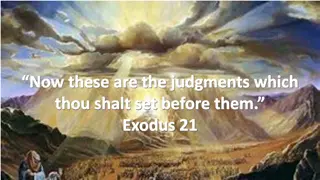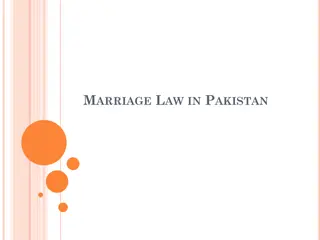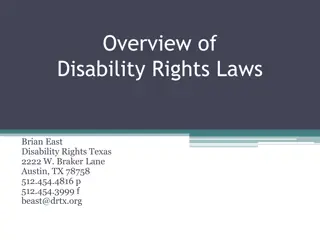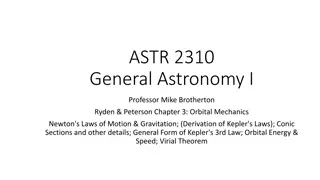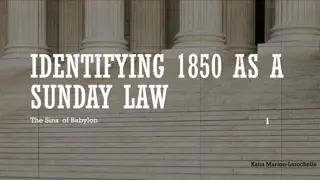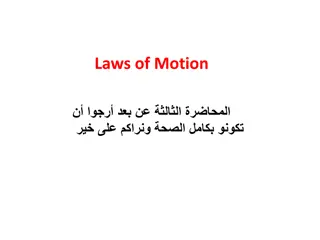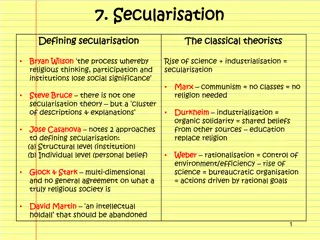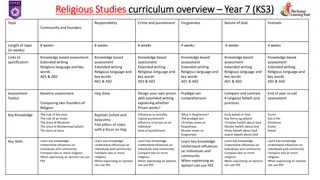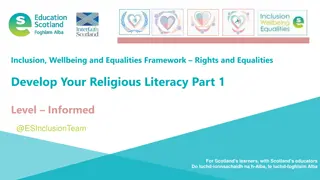Status of Family Laws in India: Hindu vs. Religious Minorities
The family and personal status laws in India vary between Hindu law and those pertaining to religious minorities. While Hindu law has seen extensive reforms, discriminatory provisions still exist. In contrast, laws governing religious minorities have undergone fewer reforms, leading to greater inequ
2 views • 4 slides
Overview of Federal Discrimination Laws in Employment
Federal discrimination laws protect employees from discrimination, harassment, and retaliation in the workplace based on various protected characteristics. Title VII, ADA, ADEA, EPA, Lilly Ledbetter Fair Pay Act, and GINA are key federal laws ensuring fair treatment of employees. These laws cover al
5 views • 42 slides
Understanding Religious Conflict: Definition and Types Explored
Religious conflict is a complex and recurring concept throughout history. Scholars have defined it as disagreements between religious groups. This conflict arises from contentious issues touching on ideology, morality, power, and identity, influenced by various socio-political, economic, and cultura
1 views • 13 slides
Evolution of Akbar's Religious Policy: A Historical Overview
In the 16th century, Akbar the Great implemented a revolutionary religious policy in the Mughal Empire. Initially a devout Sunni Muslim, Akbar evolved his stance to promote harmony and equality among all religions, fostering tolerance and understanding. This shift marked a significant departure from
1 views • 25 slides
Alcohol Ban in Saudi Arabia: Laws and Punishments
Drinking alcohol is strictly prohibited in Saudi Arabia due to religious laws. The ban extends to making, importing, and selling alcohol, with severe punishments imposed on violators, including expatriates. Reasons for the ban are rooted in Islamic beliefs and the consequences for breaking the law a
0 views • 16 slides
The Hague Convention of 1993 and Its Impact on Philippine Laws on Intercountry Adoptions and Child Welfare
The Hague Convention of 1993 plays a significant role in shaping Philippine laws regarding intercountry adoptions and child welfare. This convention emphasizes principles like the best interests of the child, subsidiarity principle, and prohibition of improper gain. It guides policies and legislatio
0 views • 10 slides
Elizabethan Religious Settlement: Unity Amidst Division
Amid religious division in England, Queen Elizabeth I implemented a Religious Settlement in 1559 to unify the country. The settlement, a blend of Protestant and Catholic elements, aimed to maintain peace and prevent rebellions. Elizabeth's strategic compromise pleased most people, though lingering t
0 views • 14 slides
Understanding Secularism: Principles and Advantages
Secularism is the principle of separating government institutions from religious entities to ensure equal rights for believers and non-believers. It safeguards freedom of religious belief and practice, upholds religious freedom, and promotes democracy and fairness. Secularism aims to prevent religio
0 views • 21 slides
Recent Changes in Labour Laws and Code on Wages, 2019
The recent changes in labour laws involve the amalgamation of 44 laws into 4 codes, focusing on wages, occupational safety, industrial relations, and social security. The Code on Wages, 2019, aims to amend and consolidate laws related to wages and bonus, applicable to all employees in India. The Cod
1 views • 104 slides
Understanding Religious Language: Cognitivism vs. Non-Cognitivism in the University Debate
This discussion explores the debate between cognitivism and non-cognitivism in religious language. Cognitivism asserts that religious claims aim to describe the world and can be true or false, while non-cognitivism argues that such claims express attitudes and cannot be verified. Flew's challenge qu
0 views • 9 slides
Audit of Physical Planning and Building Control Laws in Nigerian States
This paper discusses the audit of physical planning and building control laws in various states of Nigeria, highlighting the responses and status of laws in different states. It covers the importance of effective laws in regulating construction activities, population growth impact, and the delegatio
4 views • 22 slides
Understanding Data Privacy Laws and Regulations in Saudi Arabia
This content provides an overview of data privacy laws and regulations, focusing on the landscape of data protection laws, examples of comprehensive regulations like FIPPS and GDPR, and sector-specific laws in Saudi Arabia. It includes a homework assignment to explore Fair Information Practices Prin
0 views • 28 slides
Guide to Using the BSA Calendar of Religious Observances
The BSA Calendar of Religious Observances is a valuable resource for scheduling scouting events in consideration of various religious holidays and observances. This guide provides an overview of the calendar, highlights important dates, and emphasizes the importance of respecting religious diversity
0 views • 8 slides
Religious Accommodation Guidelines in the Army
Advising the command on religious accommodation in the Army involves understanding federal laws, DOD policies, and procedures. This includes locating and applying relevant laws, regulations, and doctrine, such as the Religious Freedom Restoration Act and Army Directives. Changes in the process impac
0 views • 36 slides
Supreme Court Health Law Cases 2014 Review
The Marshall Kapp, J.D., M.P.H. review of Supreme Court health law cases in 2014 focuses on Burwell v. Hobby Lobby Stores and Conestoga Wood. The cases involved challenges to the Affordable Care Act's contraceptive requirement based on the Religious Freedom Restoration Act of 1993. The court ruled i
0 views • 19 slides
Understanding the Role of Language in Religion
Exploring the significance of language in religious contexts, this content discusses the functions, features, lexicon, grammar, and metaphorical aspects present in religious language. It delves into how religious language upholds spiritual beliefs, persuades believers, and expresses specific attitud
0 views • 8 slides
Regulations on Religious Freedom in ASEAN Countries
Religious freedom in ASEAN countries is explored, covering religious diversity, domestic laws, and regional/international obligations. The main religions in ASEAN are Islam, Buddhism, and Christianity. Various countries ensure the freedom to practice religions, with provisions to protect public safe
0 views • 12 slides
Understanding the Cultural Dimensions of Food and Religious Influences in Culinary Arts
Explore the impact of religious beliefs on food traditions and dietary restrictions across different cultures in the culinary world. Learn about the influence of major world religions on eating habits, food choices, and culinary practices. Discover how various religious groups, such as Christians, o
0 views • 26 slides
Masterpiece Cakeshop Case: Religious Beliefs vs. Anti-Discrimination Laws
In the Masterpiece Cakeshop case, Jack Phillips, a devout Christian baker, refused to create a custom wedding cake for a same-sex couple due to his religious beliefs. This led to a legal battle addressing the clash between religious freedom and anti-discrimination laws. The case explores the complex
0 views • 71 slides
Laws and Judgments in Exodus and Leviticus
This text outlines various laws and judgments from Exodus and Leviticus, covering topics such as the treatment of servants, consequences for murder, rules for maidservants, and detailed laws on various offenses. The laws include provisions for freedom after six years of service, the treatment of mai
0 views • 8 slides
The Vital Role of Religious Institutions in Supporting Immigrants
Religions and immigration are interlinked in modern societies, where religions play a significant role in providing services, defending rights, and supporting the social cohesion of immigrants. Mainstream religious institutions serve as key actors in offering assistance, advocating for migrant right
2 views • 14 slides
Understanding Religious Language: Flew, Hare, Mitchell
Exploring the contrasting views of cognitivism and non-cognitivism in the context of religious language through the perspectives of Flew, Hare, and Mitchell. Delve into Flew's challenge on the undetectable gardener, Hare's concept of bliks, and Mitchell's response to the rationality of religious bel
0 views • 7 slides
Family Laws and Marriage Legalities in Pakistan
The legal system of Pakistan blends English common law and Islamic law, influencing various aspects such as commercial and personal laws. Family laws in Pakistan are a mix of codified and customary laws, with different laws applicable to different religious communities. Specific laws govern marriage
0 views • 21 slides
Overview of Federal Disability Rights Laws in the United States
Federal disability rights laws play a crucial role in protecting individuals with disabilities from discrimination. The main laws include the Americans with Disabilities Act (ADA), Rehabilitation Act, and Fair Housing Act. These laws cover various aspects such as employment discrimination, accessibi
0 views • 98 slides
Religious Accommodation in the Army: Advising Command
The content discusses the role of the Chaplain Corps in advising Soldiers and leaders on religious accommodation in the Army as of February 13, 2019. It covers learning objectives, legal foundations, Army policies, procedures, recent changes, and references related to religious accommodation. The in
0 views • 36 slides
Understanding Orbital Dynamics: From Newton's Laws to Kepler's Laws
Exploring the fascinating realm of orbital dynamics, this content delves into the application of Newton's laws to explain Kepler's laws and the intricacies of orbital mechanics. Deriving Kepler's laws from Newton's law of gravitation involves advanced mathematics, while also emphasizing the signific
0 views • 25 slides
Challenges to Religious Freedom in India: An Overview
India, as the world's largest democracy with a tradition of secularism, faces escalating challenges to religious freedom and civil society. The BJP-led government's Hindu nationalist agenda has led to systematic violations of religious rights, targeting minorities and activists. The tightening grip
0 views • 20 slides
The History of Sunday Laws: From Constantine to the Third Council of Orléans
The imposition of Sunday laws dates back to AD 321 when Constantine I decreed Sunday as a day of rest, with further developments occurring in 538 AD with the Third Council of Orléans. These laws signified the blending of pagan practices with Christianity, leading to the establishment of Sunday as a
0 views • 73 slides
Understanding Religious Discrimination Laws in California Workplace
Learn about the regulations and protections under FEHA and Title VII in California, including religious exemptions, accommodation requirements, case studies, and best practices to address discrimination issues effectively. Discover the statistical insights on religious discrimination complaints and
0 views • 45 slides
Understanding Newton's Laws of Motion
Dynamics is governed by Newton's three fundamental laws of motion. These laws, formulated by Newton, describe the behavior of objects in motion and at rest. Key terms such as mass, weight, momentum, force, and inertia are crucial in understanding these laws. Rigid bodies, which consist of fixed part
0 views • 22 slides
Understanding Secularisation: The Decline of Religious Influence in Society
Secularisation refers to the process in which religious thinking, participation, and institutions lose their social significance. This phenomenon is influenced by factors such as the rise of science, industrialisation, changing social attitudes, and the disengagement of the church from society. Evid
0 views • 8 slides
Philosophers' Views on Religious Experience: Insights and Critiques
This lesson delves into the perspectives of various philosophers such as Rudolph Otto, Richard Swinburne, John Hick, and Michael Persinger on religious experiences. It explores concepts like the numinous, religious knowledge, God's existence, and criticisms on the validity of religious experiences.
0 views • 7 slides
Philosophers' Views on Religious Experience: Insights from William James
Explore William James' perspective on religious experiences, including his views on existential and value judgments. Understand how James argued for the validity of religious experiences and their potential proof of God's existence. Delve into the implications of emotions and prior beliefs on interp
0 views • 7 slides
Religious and Social Conflicts Fueling the Rise of Absolutism in Europe
Social, economic, and religious conflicts in Europe played a significant role in the emergence of absolutism where monarchs wielded supreme power without sharing it with legislative bodies. Events like Spain's religious conflicts, Protestantism in England, the Spanish Armada, religious conflict in t
0 views • 10 slides
Religious Pluralism and Civil Society: A Paradox in Government Control
Understanding the intricacies of religious pluralism in the context of government control reveals a paradox where restricting religion can hinder social cohesion and economic growth. Through insights on the counterproductivity of control, the role of religious organizations in civil society, and the
0 views • 16 slides
US Religious Freedom Restoration Act (RFRA) Overview
The US Religious Freedom Restoration Act (RFRA) aims to protect the free exercise of religion by ensuring that governments do not substantially burden religious practices without compelling justification. It emphasizes striking a balance between religious liberty and governmental interests through t
0 views • 9 slides
Religious Studies Curriculum Overview for Year 7 and 8 (KS3)
Explore various topics such as responsibility, crime and punishment, forgiveness, nature of God, festivals, community, founders, worship, creation, life after death, rules and laws, relationships in this detailed Year 7 and 8 (KS3) Religious Studies curriculum. The curriculum includes assessments, e
0 views • 6 slides
Gas Laws Review Game - Test Your Knowledge on Gas Concepts and Mixed Gas Laws
Get ready to test your knowledge on gas concepts and mixed gas laws with this interactive review game. Answer questions on gas properties, volume changes, pressure variations, and more. Challenge yourself and your team members as you solve problems related to gas laws. Improve your understanding and
0 views • 7 slides
Developing Religious Literacy for Educators in Scotland
This resource aims to enhance educators' understanding of religious literacy by exploring religious discrimination, core beliefs of major faiths, and additional learning sources. It encourages educators to consider the needs of learners in relation to their religious beliefs in Scotland.
0 views • 30 slides
Settling the Northern Colonies: Religious Transformation and Colonization
The Protestant Reformation led to the emergence of Puritanism in the Northern Colonies, with figures like Martin Luther and John Calvin shaping religious beliefs. The Massachusetts Bay Colony stood as a beacon of self-government and religious ideals, while dissenters like Anne Hutchinson and Roger W
0 views • 9 slides




